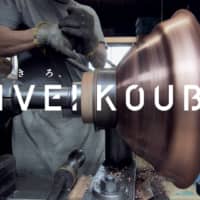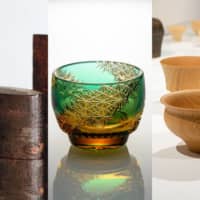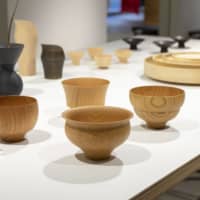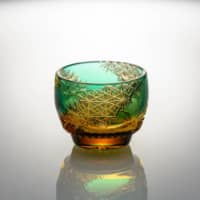The promotion of traditional Japanese crafts has taken quite a blow since the onset of COVID-19. Most major trade fairs in Japan and overseas, such as Milan’s Salone del Mobile, Paris’ Maison & Objet and Tokyo’s IFFT Interior Lifestyle Living — all of which would have included Japanese craft sections and booths — were canceled. This month, “On: Design” looks at one event that did manage to take place, and another that has turned to a digital platform.
New ways to keep up traditions
Japan Traditional Crafts Week, organized by Japan Traditional Crafts Densan, whose Aoyama store served as the event’s hub, was held earlier this month. Thirty Tokyo-based shops each introduced and sold products by craft organizations and artisans from across Japan. “On: Design” favorites included magewappa bentwood boxes at Sarasa Design Lab in Aoyama; Koishiwara pottery at Maito Design Works in Kuramae; and blue-and-white Tobe porcelain paired with Okuaizu basketry at Markus in Kichijoji. Here are several others that also highlight how a few contemporary design tweaks can emphasize the meticulous work of traditional craftspeople.
SML, a boutique in Nakameguro that specializes in earthy, hand-crafted everyday goods, displayed a collection of kabazaiku (bark woodwork) tea caddies from the Kakunodate Craft Cooperative Association. Introduced in Akita Prefecture as an alternative livelihood for lower-ranking samurai during the late 18th century, kabazaiku involves decorating wooden objects with thin layers of cherry-tree bark that is sanded and polished to reveal a distinctive natural pattern. At SML, craftsman Kengo Yonezawa’s simple bark pieces — some polished to a sheen, others left matte — were a perfect foil for a striking lineup of contemporary banded versions by other artisans.
Also in Nakameguro, minimalist clothing store Iki became the backdrop to a selection of Gato Mikio Shoten Yamanaka shikki (lacquerware) tableware and vases. Based in Yamanaka Onsen, Ishikawa Prefecture, an area famous for its wood-turning craftspeople, Gato Mikio Shoten produces several lines of contemporary works conceived in collaboration with various designers based in Japan. Its unexpected new takes on shikki items include curvy and ridged tea caddies, voluptuously rounded vases and thin-stemmed wine glasses — all carved from single blocks of wood. Like traditional Yamanaka shikki, all the pieces are left uncolored to show off the wood’s natural grain.
Inspired by 19th-century Western cut glass, Edo kiriko has always been quite glamorous. Though originally carved into clear glass, its elaborate geometric patterns became particularly popular on colored glass, which further accentuated designs. The Aoyama interiors store Real Style showcased the work of Kazutoshi Ohba, a certified Master of Traditional Crafts based in Edogawa, Tokyo. His complex incisions — combinations of classic Edo kiriko geometric patterns, other Japanese motifs and unusual representational designs — take the craft to an even more artistic level.
Kakunodate Craft Cooperative Association: kabazaiku.com; SML: sm-l.jp; Gato Mikio Shoten: gatomikio.jp/home.html; Iki: bit.ly/iki-nakameguro; Ohba Kiriko: ohba-kiriko.tokyo; Real Style: real-style.jp (all Japanese only)

Factory settings
The Tsubame-Sanjo Factory Festival, a series of factory tours in Niigata Prefecture, was founded in 2013 to aid the area’s metalworking industry by encouraging sales and creating opportunities for new apprentices. Though the COVID-19 pandemic prevented its over 100 participating businesses from opening their doors to the public, it didn’t deter the organizers, who have devised an impressive online alternative.
On weekdays from Oct. 1 through 31, Live! Kouba is uploading metalworking-themed video clips at 8 a.m., to be followed later in the day at 2 p.m. with livestreams of sections of the festival’s tours to factories and other establishments. Some of the efforts behind this comprehensive lineup are amusingly documented in a promotional video that features a graphic of the festival’s original dates crossed out, an audio clip of organizers heatedly discussing how to keep the event alive and some droll outtakes of presenters practicing for their factory walkthroughs.
Tsubame-Sanjo’s metalworking industry began with smiths forging nails during the Edo Period (1603-1868), and by the 1920s had developed to the production of carpentry and farming tools, kitchen utensils, tableware and machine parts. Viewers of the online Live! Kouba will get to see forging processes, metal cutting, mold making, welding, die casting and more. The videos and livestreams will also introduce various metalware products and their uses, as well as follow some of the factory’s workshops.
For more information, visit facebook.com/koubafes and keep an eye on the event’s website,










